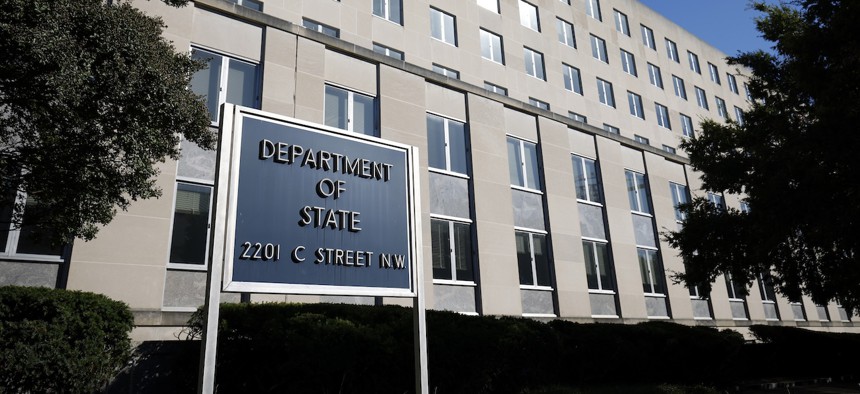
Around 3,400 State employees are expected to be impacted by the reductions. Kevin Dietsch/Getty Images
State Dept. further prepares for mass layoffs even as court block remains
A judge specified last month that State, like most major agencies, cannot yet move forward with RIFs.
The State Department continues to make preparations for significant layoffs even as it faces a court order not to proceed with them, creating a potential showdown between the executive and judicial branches.
The department on Monday rewrote its own rules for issuing reductions in force, which were expected to go out earlier this month before a court intervened at the 11th hour. That case now sits before the Supreme Court, which is expected to weigh in any day.
Before Monday, State had maintained in its internal regulations that RIFs would not be based solely on an employee’s “specific post, region or bureau.” The updated version of the Foreign Affairs Manual changed the provision to specifically account for those factors. It created nearly 800 new “competitive areas” made up of domestic organizational units, making it easier for the department to pick and choose which components to eliminate.
State noted in the update it also maintained the right to lump together employees for layoffs based on skillsets or other groupings. The department gave itself more leeway to provide less than 120 days notice, the standard period for foreign service officers.
Last month, State similarly updated its rules for firing civil service employees. The changes included loosened management’s ability to reshape competitive areas as it sees fit prior to a RIF.
Around 3,400 State employees are expected to be impacted by the reductions, with more than 300 offices eliminated or consolidated, though some of the staffing cuts have occurred through voluntary, incentivized departure. Around 2,000 employees are still expected to face layoffs. Around 700 of those are expected to be foreign service officers currently in domestic posts, according to employees briefed on the plans, or nearly 60% of those employees currently in the U.S. The remaining RIFs would impact State’s civil servants.
The American Foreign Service Association denounced the changes and said they were particularly poorly timed given the significant number of global crises.
AFSA “unequivocally opposes the State Department’s unilateral changes to the Foreign Service workforce reduction procedures, which seriously weaken America’s ability to conduct foreign policy at one of the most critical geopolitical moments in recent memory,” the group said. “Breaking with established norms and implementing a blatantly unfair system sends a destructive message to the workforce: that the department will change any rule in the service of so-called ‘efficiency.’”
The union, like several employees who spoke to Government Executive, said it expected the RIFs to take place as soon as this week regardless of where things stand in court. The State Department declined to comment on that possibility or other inquiries related to this story.
While State was already subject to an injunction that blocked most major federal agencies from issuing RIFs, the Trump administration had argued in court the department was a “special case” that merited different treatment. California-based District Judge Susan Illston rejected that argument, however, and on June 13 issued a new order demanding State not proceed with planned layoffs.
A Justice Department attorney told the court that State was scheduled to issue RIF notices the following day, June 14, but would comply with the judge’s order.
Illston made clear in her order that any action related to State’s reorganization “are prohibited by the court’s injunctive relief.” She added if the department had any question as to whether any action was enjoined, it should first seek approval from the court.
The proposed changes "may not go forward from today," Illston said, clarifying she was referring to "the impending State Department RIFs and reorganization.”
The Supreme Court could still overturn the injunction before State acts, clearing the department of any legal uncertainty. And the department could still opt to wait until any injunction lifts or it receives direct authorization from Congress.
The FAM updates are just the latest step State has taken to prepare for RIFs. Earlier this month, it sent a message to all civil service employees asking them to upload their resumes to an internal site by June 13 to “prepare for the reorganization.” It also asked staff to ensure all the information in their personnel files was accurate. Those steps are common just before agencies implement RIFs to enable HR offices to ensure they are relying on up-to-date information and determine their employee eligibility for other positions if they are laid off.
Other agencies across government have similarly taken steps so they can swiftly implement layoffs if the Supreme Court rules in the administration’s favor.
Share your newstip with us:
Eric Katz: ekatz@govexec.com, Signal: erickatz.28
NEXT STORY: National Parks scramble to fill top leadership positions, but fix could create more vacancies







